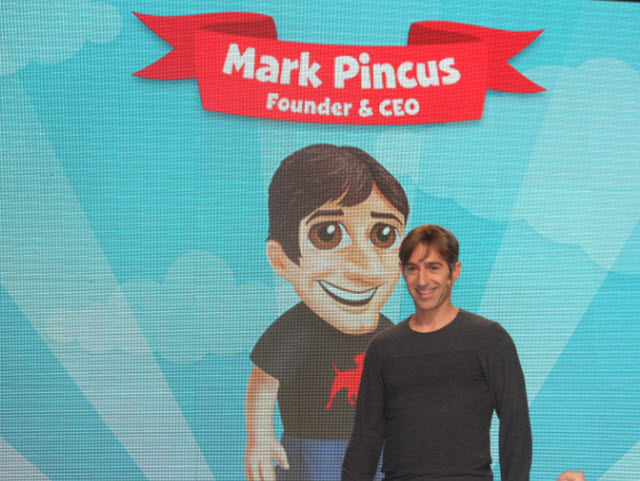 Mark Pincus, chief executive of Zynga, has been out of the public eye for months, mainly due to regulatory restrictions on what CEOs of companies filing for initial public offerings can say in public. But yesterday, he finally got on stage for Zynga’s big games rollout.
Mark Pincus, chief executive of Zynga, has been out of the public eye for months, mainly due to regulatory restrictions on what CEOs of companies filing for initial public offerings can say in public. But yesterday, he finally got on stage for Zynga’s big games rollout.
Clearly, Pincus was careful to avoid saying anything that would derail the social game company’s IPO (if that IPO happens, he could become a multibillionaire). So his appearance had to be a carefully planned event. He made no financial projections, and he focused on Zynga’s upcoming games and its goal of “connecting the world through games” that are played on any platform by everyone.
It’s been so long since Pincus has talked that it’s worth making some observations about what he said on stage and how he performed in front of the bright lights.
He hasn’t always been careful or scripted in the past. He is naturally folksy, casual and down to earth when he communicates on stage. And his talk yesterday didn’t seem scripted, although it probably was scrutinized by the company’s lawyers.
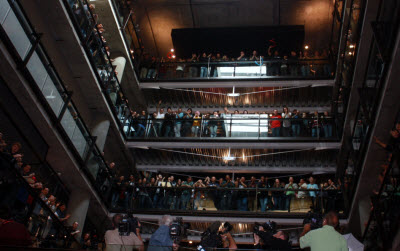 He started out with a story about the good old days at Zynga in 2007, when the company first started making games for Facebook. He said the team hired some students from the Culinary Academy across the street to create food in the company’s small headquarters. One of those students, Amelia, later became the fictional head chef in Zynga’s Cafe World game, and she’s now the head chef in Zynga’s sprawling new San Francisco headquarters for 1,700 employees. (The company has 2,500 employees worldwide.)
He started out with a story about the good old days at Zynga in 2007, when the company first started making games for Facebook. He said the team hired some students from the Culinary Academy across the street to create food in the company’s small headquarters. One of those students, Amelia, later became the fictional head chef in Zynga’s Cafe World game, and she’s now the head chef in Zynga’s sprawling new San Francisco headquarters for 1,700 employees. (The company has 2,500 employees worldwide.)
Pincus described how the team took the old Sega headquarters and converted it into a cool space that Zynga employees affectionately call the “doghouse.” At that point in his talk, he asked the crowd of journalists to turn around and look up. There, up on the upper balconies of the building were Zynga’s employees by the hundreds (pictured right). It was a moment when Pincus could recognize the efforts of his staff. He apologized to them for taking away their cafeteria for the day and asked them to go out for an expensive lunch.
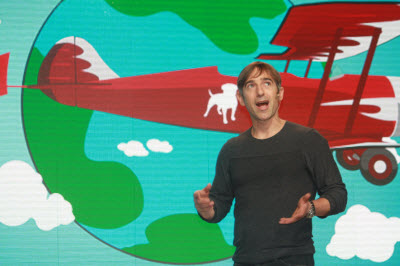 Pincus laid the groundwork for all of the presentations by senior Zynga executives. He allowed each domain expert to get on stage to describe their own games. When he introduced the company’s chief operating officer, John Schappert, who was recruited away from Electronic Arts, he said Schappert had fulfilled Pincus’ goal of finding his own replacement. Pincus said hiring Schappert to run the game operations allowed him to focus on helping Zynga employees become entrepreneurs in their current jobs.
Pincus laid the groundwork for all of the presentations by senior Zynga executives. He allowed each domain expert to get on stage to describe their own games. When he introduced the company’s chief operating officer, John Schappert, who was recruited away from Electronic Arts, he said Schappert had fulfilled Pincus’ goal of finding his own replacement. Pincus said hiring Schappert to run the game operations allowed him to focus on helping Zynga employees become entrepreneurs in their current jobs.
Pincus said, “We challenge ourselves every day to … get you guys to play. You are busy. You are on the move. You don’t have time to sit and play games. But we really think play is this macro theme and activity that we all need to fit back into our lives. Everything behind what we are building is this mission to build a platform for play.”
He added, “We are not trying to be a company that is making the next hit game. We would be happy to create the next hit game. But we are trying to do something broader than that. We are trying to have this experience make up a platform for play.” He said Zynga is trying to inspire “socialness,” or getting you to create many more friend connections. He said Zynga is tracking how well teams do at getting you to connect with people in meaningful ways.
Pincus said Zynga’s basic design principles focus on the FTUE, or first-time user experience. The best opportunity for Zynga to make an impression on a player is in the first three clicks of a game. He said that in casual games, you have to sell the player on the whole game in the first three clicks and that five to 15-minute experiences of playing should “feel like a meal.” You shouldn’t have to change your routine for Zynga’s sake.
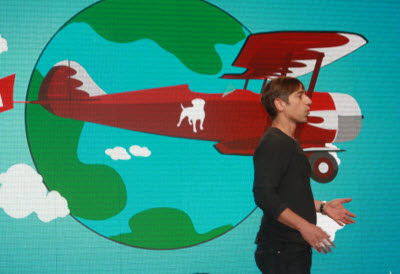 He mentioned that one new initiative, Zynga Direct, which the company has been working on for two years. It’s a platform for creating more social interactions around Zynga games played on the web or on mobile devices. But he didn’t go into much detail.
He mentioned that one new initiative, Zynga Direct, which the company has been working on for two years. It’s a platform for creating more social interactions around Zynga games played on the web or on mobile devices. But he didn’t go into much detail.
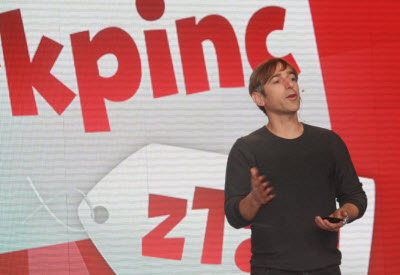 Schappert later described Direct, dubbed Project Z, as an online destination where Zynga players can go to play Zynga games. Schappert said Project Z was a “social gaming playground,” where players could play under their own gamertag names. But he didn’t go into much detail, either. In fact, Zynga probably left that initiative shrouded a bit too much in mystery, as a number of the press left the event confused.
Schappert later described Direct, dubbed Project Z, as an online destination where Zynga players can go to play Zynga games. Schappert said Project Z was a “social gaming playground,” where players could play under their own gamertag names. But he didn’t go into much detail, either. In fact, Zynga probably left that initiative shrouded a bit too much in mystery, as a number of the press left the event confused.
Pincus closed the event saying that Zynga is committed to one vision that hasn’t changed since the founding: “We want to be the biggest macro bet on social gaming.”
“We believe that this is the way everyone around the world will want to embrace play in their lives,” he said. “We know it is early. We know it is primitive.” He said social gaming will come to life in the next few years and will become more mobile, so that you will get something like a World of Warcraft experience in five or fifteen minutes.
All in all, Pincus communicated the company’s vision and came off as personable. But he didn’t fully succeed in providing answers to questions that his own presentation raised.
Check out the video of Pincus below.
VentureBeat's mission is to be a digital town square for technical decision-makers to gain knowledge about transformative enterprise technology and transact. Learn More
